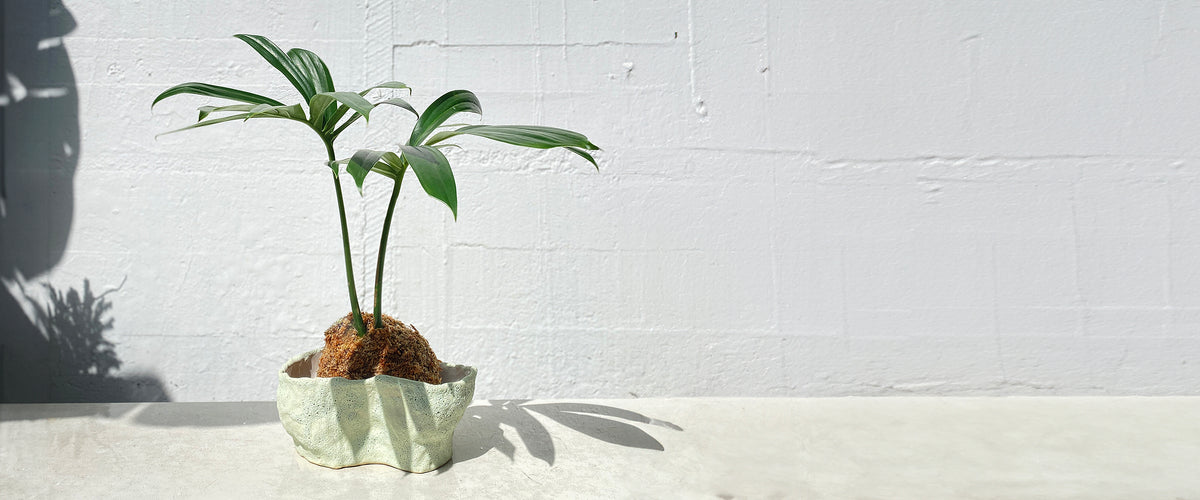Pet Friendly Plants

Do you want your home to be a lush jungle of plants, but you’re worried about your furry friends? We’ve handpicked a selection of the safest choices for your leafy sanctuary.
All the plants we have chosen for the pet safe team are listed as non-toxic to pets by animal authorities like NZ SPCA and ASPCA. It’s worth noting that consuming any plant might cause a tummy ache, but the ones listed are non-toxic and widely regarded as pet-safe by reputable experts.
In no particular order, here are our top picks for pet-safe houseplants that will brighten up your home and keep your pets safe and happy.
Hoya (Hoya sp.)
Who doesn’t love a Hoya, aka the wax plant, its thick, glossy leaves and star-shaped clusters of flowers make even non-plant people smile (yes, we also find it hard to believe non-plant people exist).
It's adaptable, easy to care for and pet safe, a prime choice for newbies and experts alike. Plus there's about a million different varieties. But the Hoya’s real magic is its scent, it perfumes your space with a lovely fragrance that comes alive at night.
Are you having a hard time getting your Hoya to bloom? We’ve got you sorted. You’ll find all the right advice in our Bloomin’ Hoyas blog post!

Chain of Hearts (Ceropegia woodii)
Looking for a pet-safe houseplant that’s as charming as it is resilient? The Chain of Hearts offers trailing vines with dainty, heart-shaped leaves that are harmless to curious pets.
It’s a low-maintenance beauty that prefers bright, indirect light, making it ideal for high shelves or hanging baskets. Perfect for those of us who occasionally forget to water (we’ve all been there), the Chain of Hearts won’t hold a grudge - it can handle a little neglect and even thrives with a bit of dryness, making it the ultimate no-fuss, pet-safe plant.

Calathea (Calathea sp.)
Calathea orbifolia is a real show stopper, with its huge silver-striped leaves, it adds a touch of elegance to your space. This beauty thrives in bright, indirect light but can be a bit moody if it doesn’t get enough.
Suited for seasoned plant parents, it doesn’t like to dry out completely, it needs frequent checking to make sure the soil moisture is just right. Calathea orbifolia are known for their leaf movements, they move all day and face up at night, almost as if they're getting ready for bed, awww!
Just a heads up - this houseplant can be sensitive to tap water and prefers the finer things in life, like rainwater or filtered water. And while it may sulk after repotting, with the right care, it will thrive, making it a fabulous addition to your pet-friendly plant collection.

Calathea orbifolia
Moth Orchid (Phalaenopsis spp.)
Moth Orchids or Phalaenopsis Orchids are some of the most loved among the orchids, thanks to their slightly easier care and stunning flower show. They make a perfect welcome home gift for your friends with furry family members and this darling can live up to 20 years.
It's gorgeous flowers bloom for 2 or 3 months and with proper care, your moth orchid will rebloom, making it a lasting and rewarding plant. The Moth Orchid is known for its unique flower shape which resembles a moth in flight, hence its common name.
For a deep dive into all things orchid, check out our Orchid Obsession blog post!

Mini Phalaenopsis Orchid
Birds Nest Fern (Asplenium nidus)
For those looking for an easy-to-care for plant that adds a touch of glossy green to your space, look no further than the Birds Nest Fern. Its unique leaves grow from the centre in, you guessed it, a nest-like pattern!
This fern loves bright, indirect light and can tolerate slightly lower light levels, it also loves a nice humid environment - like a bathroom. It’s an epiphyte by nature, often growing on palm trees in the wild, and remains compact and slow-growing indoors.
Along with being safe for your pets, we love that it's also an air purifier, making it another multi-purpose plant to have in your collection.

Unfriendly Houseplants
While we've highlighted some fantastic pet-safe options, it's equally important to be aware of plants that can pose a risk to your furry companions. Some common houseplants, like the Peace Lily (Spathiphyllum) or Philodendron, can be toxic to pets if ingested. You can visit here to view a longer list of the most toxic plants to pets. Always be sure to make informed decisions about the plants you buy, checking to see if they will be safe for your pet.
If you suspect your pet has nibbled on a toxic plant, contact your vet immediately for guidance. Being informed is the first step to ensuring a safe and happy home for both you and your pets!
Creating a vibrant, plant filled home doesn’t have to come at the expense of your pets’ safety. Cultivate your green oasis while keeping your pets happy and healthy with our selection of pet safe plants.
Ready to add some pet-friendly greenery to your space? Explore our collection of safe houseplants, and don’t forget to share your plant parenting stories with us below!
